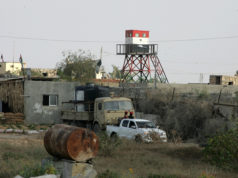A lick of historicism would serve the Obama administration well in its much-too-friendly relationship with Egypt’s Muslim Brotherhood (MB) and other manifestations of the Arab uprising. There is a political space between going to war with countries that do not share our democratic norms and principles, and embracing them as if they did — or could. The United States has experience standing in that space. We did it and we won the Cold War.
The U.S.-Soviet face-off involved two powerful countries standing for two powerful and irreconcilable ideologies: one free, one not; one with individual rights and liberties, one without; one with a belief in entrepreneurial capitalism, one state-driven. We won and they lost in part because people had faith in one and not the other.
The MB and its Shiite counterparts, like the early Soviets, believe their own ideology and promote Islamic society based on God’s requirements for man. In Egypt and elsewhere they are well-organized and well-funded, and they reject Western political, moral, and social standards. Their belief in an expansionist Islamist revival and expressed religiosity resonate with poor, rural, and conservative people for whom the West is a great unknown.
People don’t drop those sorts of beliefs when they win — they enforce them and enshrine them in government to ensure their greatest impact. President Obama did. It underestimates and misrepresents the MB and others to assume that they are closet capitalists and free thinkers.
The Egyptian Brotherhood can’t be faulted for saying last week what the Obama administration wanted to hear. The administration, however, can be faulted for hearing what it wanted. The White House and the State Department welcomed the MB because it won an election — an elementary mistake conflating majority rule with democracy. Then they erased the Brotherhood’s years of history, politics, and practice — a second elementary mistake assuming that governance will make a radical organization prioritize pothole management and re-election.
Rather than demanding or expecting — or bribing and hoping — the United States should apply its Cold War lessons to Egypt and beyond.
After the United States spent decades ignoring Soviet depredations against their own people, and after an uncomfortable experience for both entities as wartime allies, the occupation of Central Europe made it impossible to accept the Soviet system as compatible with our own. Certainly we recognized the Soviet Union, talked to it, negotiated with it, traded in some measure with it, and generally tried to avoid war with it. But we also generally did our best to defend against it, restrict it, deny it victories, and keep faith with its people.
Our diplomats knew the names of dissidents and prisoners and asked about them in Moscow — Secretary of State George Shultz’s 1987 Moscow Seder was a shining moment for the West (and counterpoint to Secretary of State Clinton’s elevation of climate change over human rights in China). We had trade restrictions, the Helsinki process, COCOM, and Radio Liberty/Radio Free Europe to tell prisoners of communism the news of the West and the news of their own countries.
During the Cold War, we were good at the distinction between the people and their government. We didn’t expect the Soviet government to be like us; instead, we expected the Soviets to know that we were watching and that their choices would cost them. When the Soviet Union collapsed, the dissidents said, “We knew you were there; we knew you were on our side.”
Our Western heritage — not so much electoral politics, but free speech, rule of law, free-market economics, independent judiciaries, property rights, and tolerance — is, in fact, responsive to the economic and social conditions confronted by people across the Middle East and North Africa. It is not arrogance to say so. But while the U.S. demands and cajoles Egypt and others to be “democratic” and tolerant, the Obama administration has paid only lip service to the universal benefits of Western civilization, primarily by supporting the winners of referendums masquerading as elections.
Victorious Islamist governments are unlikely to listen now to the message of the West, but many people in the region need us and want us. And at this crucial moment, the administration’s apparent lack of confidence in our form of government is astonishing, as is Justice Ruth Bader Ginsburg’s preference for the South African constitution over our own as a model for Egyptian lawmakers.
There are neither easy military nor diplomatic answers — and certainly no quick ones — but scholar Robert Kagan offered four factors for our government to consider in combination when making policy: regime type, the role of Europe, military capability, and America.
Authoritarian regimes don’t make good partners because they are inherently unstable — Russia and China no less than Egypt and Syria. Europe is our “go to” ally by history and shared political philosophy, and our closest allies — including Israel — will always be democracies. American influence in the world is, quite simply, proportional to our ability to protect ourselves, our allies, and our interests. And America matters because no one else is us. We can exercise our leadership unless we abdicate it.
As Islamic-oriented governments emerge, beginning with Egypt’s MB, they should be told we will be waiting for them to prove that their actual governance is different from their political ruminations. If so, there could be room for a constructive relationship despite our differences. If not, the U.S. should stand — as it has before — for the people against their dictatorial regimes.





